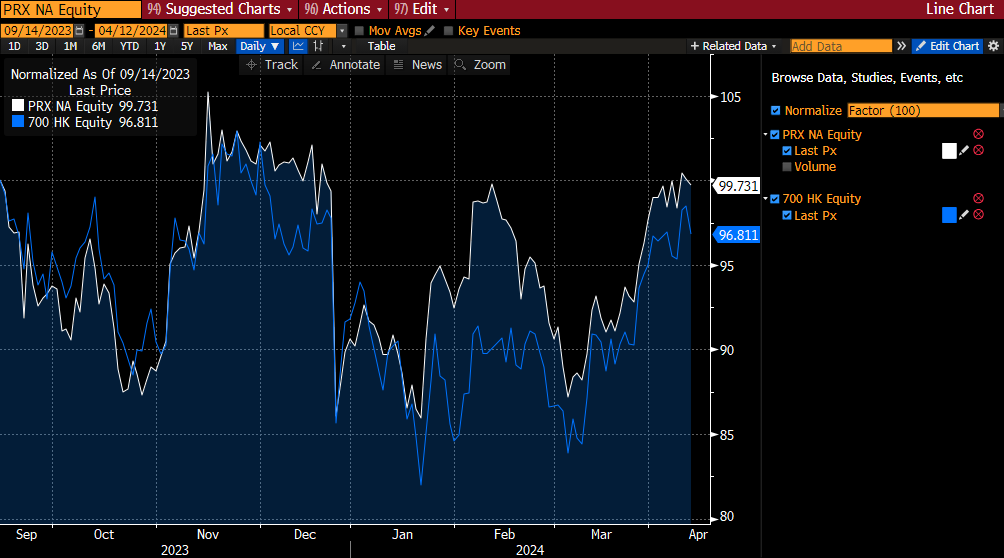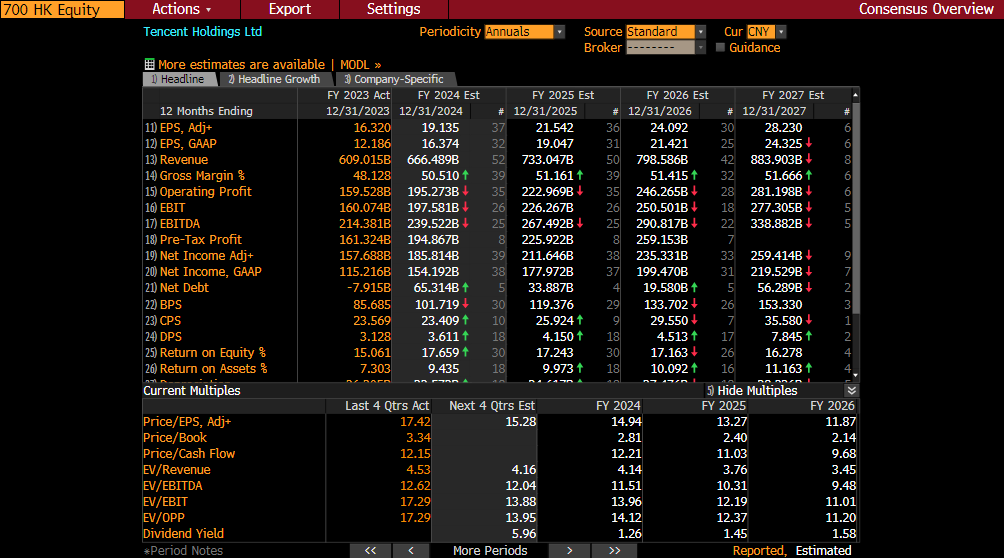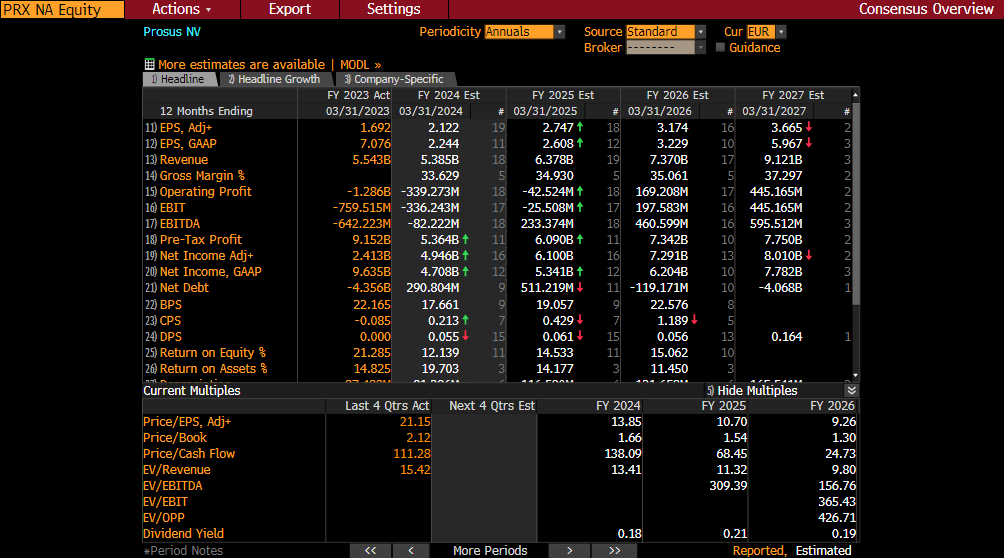With a market cap of €74bn, Prosus is the largest European listed consumer internet company. It is perhaps best known for its c.25% shareholding in Tencent, currently valued at €86bn. Unsurprisingly, and as shown below, PRX’s share price broadly tracks that of Tencent, with the market likely not affording due consideration to the Group’s other significant assets – it has €8bn of other listed investments and €21bn of unlisted investments. The Group has de minimis (c.€0.02bn) net debt. All in all, this leaves Prosus with a net asset value of €115bn (€46.3 per share) which investors can buy today for €29.4 per share, a 36% discount. Sure, conglomerates generally do trade at a discount, but a number of strategic steps being undertaken by the Group suggest to this shareholder that PRX can narrow this discount – (i) share buybacks; (ii) monetisation of assets; (iii) driving portfolio efficiencies; and (iv) simplification.

Before delving in to the strategic levers that I believe PRX can deliver value for investors from, it is worth spending some time on the Group’s portfolio of assets.
PRX has “more than 80 investments across more than 100 markets“. As mentioned, these span listed and unlisted companies; part and wholly owned and/or controlled. As of 12 April 2024, PRX had €94bn of listed investments, of which c.90% is represented by the shareholding in Tencent, a world-leading internet and technology company. Other meaningful listed holdings include a €3bn stake in Chinese shopping platform Meituan; a €2.5bn stake in the German headquartered food delivery player Delivery Hero; €1.4bn of shares in Singapore travel service conglomerate Trip.com; and smaller (sub-€1bn) shareholdings in online remittance service provider Remitly; Edtech specialist Udemy; US software firm Similarweb; (another Edtech) Skillsoft; (another food delivery firm) Doordash; and social platform VerticalScope.
PRX’s unlisted investments are mainly drawn from the same sectors as the publicly quoted names – Classifieds; Food Delivery; Payments & Fintech; and Edtech. Prosus Ventures is the Group’s VC arm and it has invested $1.4bn in more than 40 high potential firms.
By sector (combining both the private and public assets), 77% of PRX is in Social & Internet Platforms; 8% in Food Delivery; 3% in Classifieds; 4% in Payments & Fintech; 2% in Edtech; 2% in Etail; 2% in Ventures; and 2% in ‘Other Ecommerce’.
As mentioned in the introduction, PRX trades at a discount to the value of its holding in Tencent alone, so in buying Prosus you get exposure to Tencent at a discount and investments in c.80 other businesses for free. Sure, conglomerates generally tend to trade at a discount, but I believe that PRX has a number of levers that should at least narrow this discount. Let’s review these in turn.
(i) Share Buybacks. PRX announced an open-ended share repurchase programme in June 2022, funded by the sale of its shareholding in Tencent. By 30 September 2023, this programme had created over $25bn of value, as 17% of the PRX free float was repurchased at a discount to NAV, leading to 7% NAV accretion per share for continuing shareholders. PRX says that “while the discount remains elevated, we envision no changes to the parameters of the programme”. PRX further notes that its “open-ended buyback program increases our per share exposure to Tencent”. This is an important consideration, given the analyst consensus for Tencent is that it will deliver stronger dividends over the coming years, which will augment the cashflow that PRX is unlocking through its share sales from its investment in the company.

(ii) Monetisation of assets. In PRX’s latest (H1 2024) results, the Group said it would “adopt a more dispassionate approach to portfolio management”. During CY 2023 Prosus exited OLX Autos and sold PayU GPO (for $610m). On the analyst call following the release of the interim results, management was asked to elaborate on its plans to ‘crystallise’ value from its portfolio. The CEO said: “Crystallisation for me is really about highlighting value. And that could happen through a sale, but more likely, in the near to mid-term, through listing businesses. Now, I want to be very clear. Our intent is not to list every single business in our portfolio that’s privately held. Listing is appropriate for businesses when that event can actually help the business, or perhaps there a valuation disconnect between what an asset could be worth in the public markets versus what it’s worth under private ownership“.
(iii) Driving portfolio efficiencies. The end of the ‘zero interest rate environment’ from 2022 onwards has, to my mind, put more discipline on business models generally. We have seen a lot of early stage companies being compelled to accelerate the journey to profitability. Prosus is no exception to this trend. At its Capital Markets Day in December 2022, management set out its plan to achieve profitability from its consolidated Ecommerce portfolio by H1 of FY 2025. This was brought forward to H2 of FY 2024 in the most recent (H1 FY 2024) results, which showed that in the six months to end-September 2023 PRX’s Ecommerce portfolio had consolidated trading losses of $36m, a $220m improvement from the prior year period. The overall PRX portfolio delivered very impressive topline performances, with revenue growth across all divisions (Etail +4% y/y; Edtech +11% y/y; Food Delivery +17% y/y; Classifieds +32% y/y; Payments & Fintech +32% y/y) in H1 2024, and margin improvement in all divisions ranging from 2ppts to 15ppts y/y. The revenue performance is particularly pleasing as it shows the Group isn’t simply trying to ‘cut its way to glory’.
(iv) Simplification. Prosus made its stock market debut in Amsterdam in September 2019, spun out of the South African conglomerate Naspers, as the latter tried to address its valuation discount by listing in a more liquid market with superior capital allocation. Following shareholder approval in September 2023, the cross-holding of shares between Prosus and Naspers was removed, simplifying the corporate structure while maintaining the economic interest split. While this helped to make the PRX story ‘less complicated’, I think there is scope to simplify the narrative further by streamlining the number of verticals that the Group operates across through disposals – put simply, if Prosus becomes less of a conglomerate, then logically it should have less of a conglomerate discount.
Bringing it all together, as a shareholder in Prosus, I see the potential for attractive returns as: (i) loss-making consolidated Ecommerce businesses transition into profitability; (ii) the Group recycles capital from Tencent into buying back its own shares at a discount; and (iii) other (non-Tencent) assets – for which the market currently appears to be attributing a negative value – are divested. I appreciate that (i) and (iii) have a degree of overlap, but given PRX’s sprawling interests and the broad-based uplift in performance across all of its verticals demonstrated in the recent results, I don’t believe that disposals would derail the improving trend in underlying earnings.
Sell-side consensus, shown here, suggests that analysts (at least) are buying into the same narrative. At a high level, the market expects to see good top-line growth combined with margin expansion that leads to a step change in earnings. Based on this consensus, PRX is very cheap on conventional earnings metrics and the expected strengthening of the balance sheet (rising net cash over the coming years) will likely provide management with considerable optionality around further capital returns. All in all, I remain a very happy shareholder in PRX.
